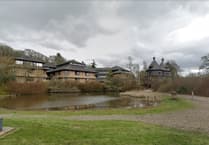TODAY marks the 50th anniversary of the flooding of a north Wales village to create the Tryweryn reservoir.
Though many Welsh villages had been flooded to create reservoirs Capel Celyn, the tiny Welsh speaking village lost in 1965 to supply drinking water to Liverpool, occupies a special place in modern Welsh history.
The story of a Welsh speaking community being forced from their homes, for a ’greater good’ however also has significance in Breconshire.
Twenty five years earlier the thriving, largely Welsh speaking community of the Epynt was dispersed to make way for a military training area in June 1940 as part of Britain’s Second World War effort.
Historians and social commentators say the flooding of Capel Celyn marked a political awakening in Wales. A combination at the time of renewed interest in Welsh devolution and protest politics ensured Tryweryn became a political flashpoint and it has been remembered as a turning point in the Welsh political landscape.
The Epynt’s story has however failed to capture the imagination of the public in a similar way to Tryweryn.
The requisitioned Epynt is still in use today as the Sennybridge Military Training Area. The clearance of the 220 strong community who lived on 54 farms scattered across the mountain saw one of Breconshire’s last remaining Welsh language strongholds disappear and the boundary of ’Welsh speaking Wales’ pushed further west.
Welsh folk singer and former Plaid Cymru president Dafydd Iwan has lamented the loss of the land to the military in his music while Welsh peace group Cymdeithas y Cymod has staged protests at the Epynt.
In 2010 the Brecknock Federation of Young Farmers’ Clubs launched its Cofio’r Epynt - or Remembering Epynt - project to celebrate, and record the memories of surviving members of the mountain community forced from their farms. The group also won the Wales YFC drama prize in 2010 for its play Golau’r Epynt which portrayed the clearances from a child’s point of view.
Former Epynt resident Idris Jones, who was 82 and living in Llanwrtyd Wells in 2010, contributed to the YFC history project. He said at the time: "I remember the day my father was pulling a horse and cart when an Army vehicle came up to the farm yard and the soldier told my father, ’Don’t do any more work because you will have to move out in three months time,’ and that was the end of it."




